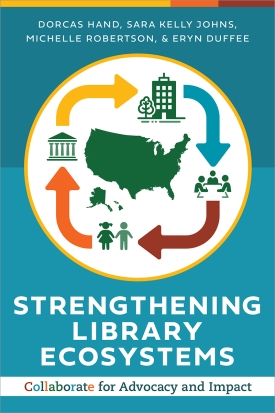91´«Ă˝ Ecosystem Initiative
91´«Ă˝

The 91´«Ă˝ Ecosystem Initiative is a multi-year effort to strengthen the library ecosystem through identification of shared priorities for action and unified messaging. Today, the effort is guided by the State Ecosystem Subcommittee of the Committee on Library Advocacy (COLA). The group's charge includes examining 91´«Ă˝'s practices and policies to ensure alignment with and support for ecosystem best practices, as well as convening ongoing conversations and programming that support and connect ecosystem efforts.
A library ecosystem is the interconnected network of all types of libraries, library workers, volunteers, and associations that provide and facilitate library services for community members; families; K-20 learners; college and university communities; local, state and federal legislatures and government offices; businesses; nonprofits; and other organizations with specific information needs.

A patron of one library is the potential patron of any other library at a different time of life or location. No library exists independent of the library ecosystem. When we stand together in mutual support using common messaging themes that demonstrate this interconnectedness, every library is stronger.
NEW: Strengthening Library Ecosystems: Collaborate for Advocacy and Impact

As more libraries face attacks on core values such as access and intellectual freedom, this adaptable resource demonstrates a variety of methods library workers can use to kindle and strengthen legislative and public awareness advocacy efforts with colleagues from across library types and geographic areas. .
In 2020, 91´«Ă˝'s Ecosystem Task Force published the ONE VOICE toolkit to help library organizations assess and extend the strength of their ecosystems, and to identify and pursue priorities for advocacy and legislation. While written for ecosystems at the state level, the framework can apply to the library ecosystem at any level, and can include a wide range of library organizations such as friends groups and trustees, vendors, literacy groups, and all types of libraries and library organizations..
The toolkit is anchored by the Ecosystem Continuum, a rubric to help organizations examine the library environment with a focus on four strands that serve as pillars for a healthy ecosystem:
- leadership
- communication
- collaboration
- sustainability
A group can start where they see themselves in the rubric, wherever they think they can get the most traction and best work together to build new or strengthen existing structures.
Laying the groundwork for the Ecosystem Continuum is an Implementation Guide that will support organizations and individual ecosystem builders no matter where they fall along the path towards a thriving and unified library ecosystem that is more impactful than its individual parts. The guide contains links to resources that support a focus on ecosystem development, from an assessment checklist to templates for building a shared agenda to visualization tools for those organizations or individuals that seek an extra boost in securing buy-in to make ecosystem efforts a priority. Some of those tools are shared here.
- Self-Assessment for State Ecosystem Continuum
- Ecosystem Agenda Building: Information Gathering (Template)
- State & Local Year-Round Advocacy Checklist
- Recording Progress Towards a Library Ecosystem (Example) (Template)
- Annual Assessment of Progress Towards Ecosystem Sustainability
- Strong Library Ecosystem Recipe (visualization tool)
Questions? Visit the Library Ecosystem Toolkit FAQs or contact: ecosystem@ala.org.
Resources
Public, School and Academic Libraries Fact Sheet
2023
[webinar]
presented by 91´«Ă˝'s Ecosystem Subcommittee, May 10, 2023
In this interactive webinar, the 91´«Ă˝ Ecosystem Subcommittee, Emily Drabinski, Dr. Lucy Santos Green, Beth Thomas and Tricina Beebe, and Skip Dye discuss how they have activated ecosystem networks for youth librarianship, library legislative activity, and 91´«Ă˝ and partner organizations with a vested interest in library activism.
[webinar]
presented by 91´«Ă˝'s Ecosystem Subcommittee, December 7, 2021
The 91´«Ă˝ Ecosystem Subcommittee of the Committee on Library Advocacy (COLA) builds awareness of why and how the Ecosystem Toolkit helps all types of libraries and their leadership/professional organizations build relationships for effective legislative and community advocacy. Subcommittee members Rachel Minkin (Michigan State University) and Dr. Michelle Robertson (University of Central Oklahoma) offer examples of how the Toolkit is being utilized in Oklahoma, Michigan, and Tennessee followed by a panel of speakers reflecting the impact of Ecosystem work.
[webinar]
presented by 91´«Ă˝'s State Ecosystem Task Force, October 29, 2020
91´«Ă˝'s Statewide Ecosystem Task Force has spent the last year working together to create a toolkit for state associations and their partners. The resources are intended to help build an internal set of relationships among all types of libraries and all their leadership/professional organizations for the purpose of strengthening advocacy to a variety of audiences. Hear from individuals who are doing the work within their states to strengthen their ecosystem and get a quick tour of the Task Force’s new toolkit.
State ecosystem work
presented to the Texas Association of School Library Administrators, May 2021
presented during Michigan Library Advocacy Day, April 2021
South Carolina Library Association, SC Association of School Librarians, and Friends of SC Libraries, Spring 2021
Alki, the Washington Library Association Journal, March 2021 [p. 23]
Texas Library Journal, Winter 2020
presented to Michigan Library Association by Ecosystem Task Force member Steven K. Bowers, November 18, 2020
91´«Ă˝ divisions spread the ecosystem word
College and Research Libraries News, June 2021
AASL's Knowledge Quest, December 29, 2020
The work continues
The ecosystem initiative continues as a subcommittee of the Committee on Library Advocacy.
Ecosystem Subcommittee co-chairs for 2024-2025 are Dorcas Hand and Nanette Donohue:
ecosystem@ala.org
Staff liaison: Jazzy Celindro
jcelindro@ala.org





